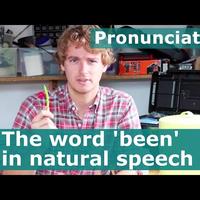21- How fluent speakers pronounce 'been'
Hi. I'm Tim and this is my Pronunciation Workshop.
Here, I'm gonna show you how English is really spoken. Come on, let's go inside.
Today, I'm going to use two things to help me demonstrate a feature of English pronunciation.
This is a bin and this is a bean. What's the connection? Well, I'm sure you know the past participle
of the verb 'to be' - 'been', right? Well, we asked some people how long they had been
in London.
I've been in London seventeen years.
I have been in London seven years. I've been in London for more than a year now.
I've been in London every summer since I was eighteen.
Now, they all used the word 'been' - but nobody
actually said 'been'. Listen again. What word do you actually hear them say?
I've been in London seventeen years.
I have been in London seven years. I've been in London for more than a year now.
I've been in London every summer since I was eighteen.
In fluent everyday English, when the auxiliary
'been' is not stressed its pronunciation changes to /bɪn/. 'I've been in London since 2015'
becomes 'I've /bɪn/ in London since 2015'. This is what's known as a weak form and it
helps speech to flow more naturally and fluently. Here are some more examples.
I've been working here for several years.
How long have you been waiting? It's been years since I went to the cinema.
What have you been up to since we last met?
So you've heard the examples, and now it's
your turn. You know the drill: listen and repeat.
I've been working here for several years.
How long have you been waiting?
It's been years since I went to the cinema.
What have you been up to since we last met?
Well done. And remember, if you want to learn
more about pronunciation, then please visit our website, bbclearningenglish.com. And that
is about it from the pronunciation workshop for this week. I'll see you soon. Bye bye! Now,
what to do with this old bean... of course, put it in the bin. Oww! I should've been more
careful... again.

